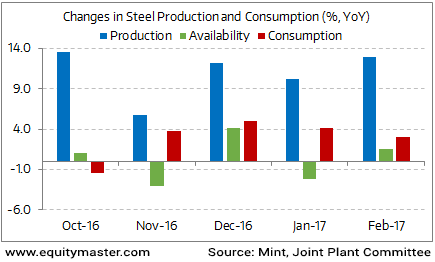Investment in securities market are subject to market risks. Read all the related documents carefully before investing
Grab Our Small Cap Recommendation
Service at a 60% Discount
- Home
- Todays Market
- Indian Stock Market News May 17, 2017
Sensex Opens Flat; Tata Steel Rallies 4% Wed, 17 May 09:30 am
Asian stock markets are mostly lower on Wednesday, tracking the mixed cues from Wall Street. The Nikkei 225 is off 0.65%, while the Hang Seng is down 0.28%. The Shanghai Composite is down 0.1%. US stock markets closed slightly lower after growing concerns about the US President Donald Trump's administration is weighing on the risk appetite. Stock markets in Europe also closed their previous session in red.
Meanwhile, Indian share markets have opened the day on a flat note. BSE Sensex is trading lower by 24 points and NSE Nifty is trading lower by 16 points. Meanwhile, S&P BSE Mid Cap and S&P BSE Small Cap are trading up by 0.1% respectively. Losses are largely seen in pharma stocks, FMCG stocks and capital goods stocks.
The rupee is trading at 64.07 against the US$.
In news from the economic sector, after introducing revised macroeconomic indicators of Index of Industrial Production (IIP) and Wholesale Price Index (WPI) by changing the base year for data computation to 2011-12 from 2004-05, chief statistician TCA Anant has said that upcoming gross domestic product (GDP) numbers which are scheduled to release on May 31 will include the impact of revised data series for IIP & WPI.
Ananat said that GDP is supposed to reflect accurately the value added as to estimate using old data that is available. Noting that these changes in the base year of data series call for a revision in the GDP numbers, Anant said that new series of numbers will be incorporated to GDP compilation and added that the actual implications on the incorporation will be known only when the GDP data gets released.
Just Released: Multibagger Stocks Guide
(2017 Edition)
In this report, we reveal four proven strategies to picking multibagger stocks.
Well over a million copies of this report have already been claimed over the years.
Go ahead, grab your copy today. It's Free.

The chief statistician also stated that the next revision in the indices of all economic indicators will coincide. The government revised the base year of IIP and WPI to a new base year of 2011-12 from 2004-05 to make the indices a better measure of the economic activity.
Under WPI series, it has also added a new WPI food index to capture the rate of inflation in food items and apart from a new base year, the revision also includes changes in the basket of commodities and assigning of new weights.
Moving on to news from the steel sector. As per The Livemint, Tata Steel Ltd on Tuesday reported a surprise March quarter consolidated loss of Rs 11.68 billion as it took a one-time charge related to the closure of its British pension scheme.
Reportedly, Tata Steel's UK arm was close to resolving pension issues, which brings the unit a step closer to a potential merger with ThyssenKrupp AG. The March quarter loss was narrower than the Rs 30.42 billion loss Tata Steel reported a year ago. Tata Steel's revenue rose 30.4% to Rs 353.05 billion as the company sold more steel products in India.
Tata Steel also said it was looking at the capital expenditure of Rs 70 billion in the current financial year. It had net debt of Rs 730 billion at the end of March.
Meanwhile, as per an article in The Economic Times, Tata Steel has agreed the key commercial terms of a deal to cut benefits and improve the funding position of its British pension scheme. The deal agreed with the scheme's trustees, will see Tata plough 550 million pounds into the final salary British Steel Pension Scheme.
The pension scheme was a major stumbling block in talks to merge Tata Steel's British and European steel assets with those of Thyssenkrupp, because the German company was opposed to taking on Tata's 15 billion pounds in UK pension liabilities.
Tata Steel share price began the day up by 4% on the BSE.
Meanwhile, JSW Steel Ltd is keen to have a long-term arrangement with Odisha Mining Corp. to secure iron ore supplies for its planned steel plant.
JSW Steel share price opened the trading up by 3.2% on the BSE.
No Takers For Domestic Steel
The government's proposal to give domestic steel makers a preference in government projects should protect them from cheaper imports. But in the meanwhile, the steel makers are chasing imports out by ramping up production. In February, domestic steel output rose by 12.9% YoY, as large private steel producers such as Tata Steel and JSW Steel ramped up output. Imports during the first eleven months of FY17 dropped by 39% YoY.
But the bigger concern is weak consumption growth. The consumption data over the past few months clearly show that there are no takers for domestic steel. So steel makers have been forced to export more, with overseas shipments up by 78% YoY in the fiscal till February.
For information on how to pick stocks that have the potential to deliver big returns, download our special report now!
Read the latest Market Commentary



Equitymaster requests your view! Post a comment on "Sensex Opens Flat; Tata Steel Rallies 4%". Click here!
Comments are moderated by Equitymaster, in accordance with the Terms of Use, and may not appear
on this article until they have been reviewed and deemed appropriate for posting.
In the meantime, you may want to share this article with your friends!